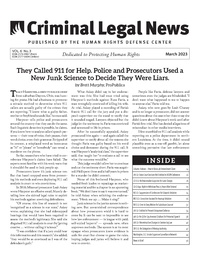by Brett Murphy, ProPublica
Tracy Harpster, a deputy police chief from suburban Dayton, Ohio, was hunting for praise. He had a business to promote: a miracle method to determine when 911 callers are actually guilty of the crimes they are reporting. “I know what a guilty father, mother …
by Anthony Accurso
The Supreme Court of Indiana reversed the denial of a suppression motion after finding that the arresting officer failed to advise the defendant of his right to counsel prior to consenting to a search of his home, as is required by Pirtle v. State, …
by Dale Chappell
The slam dunk for federal habeas claims, if such a thing exists, would be a claim that successfully challenges the evidence in a criminal case. By tossing the unlawfully-obtained evidence, not only would the conviction be overturned, but the prosecution wouldn’t have a case for …
by Jacob Berrett
The U.S. Court of Appeals for the Seventh Circuit affirmed the U.S. District Court for the Northern District of Indiana’s order granting Dewayne A. Dunn’s petition for habeas corpus based upon ineffective assistance of counsel and prejudice where trial counsel failed to consult a forensic …
by Anthony W Accurso
The Supreme Court of Colorado, sitting en banc, ruled that a state trooper lacked reasonable suspicion to initiate a traffic stop based on the driver allegedly making an unsafe lane change based on the totality of the circumstances.
Trooper Bollen was patrolling …
by David M. Reutter
The Court of Appeal of California, Second Appellate District, ruled that Miguel Lopez “demonstrated a reasonable probability that if he had been properly advised of the immigration consequences of his plea, he would not have pleaded no contest to an offense that would subject …
by Douglas Ankney
The Court of Appeal of California, First Appellate District, affirmed the Solano County Superior Court’s order granting Juan Pantoja’s motion to suppress evidence because Vacaville Police Officer Chris Hill did not have articulable facts to support a reasonable suspicion to pat search Pantoja. The Court …
by Jacob Barrett
The Supreme Court of New Jersey ruled that under the Edwards rule the defendant did not “initiate” further communications with police officers at the conclusion of an unlawful interrogation, so all evidence obtained during the subsequent interrogation must be suppressed.
In February 2014, Abayuba …
by Matt Clarke
The Supreme Court of Missouri, sitting en banc, held that the trial court committed prejudicial error by allowing a police detective to testify at trial regarding an out-of-court statement made to police by a person who did not testify at trial to prove the …
by Michael Thompson
For years now, cars have allowed us to synch our devices with their onboard computers, giving us hands-free and Wi-Fi access along with a wealth of infotainment options. A user could be forgiven for believing the data is transient, i.e., temporarily stored during use and …
by Douglas Ankney
The Supreme Court of Ohio held that Terry Barnes Sr. had a reasonable and legitimate basis to withdraw his guilty plea before sentencing when he discovered evidence that had been withheld from him by his attorney and that evidence would have negated his decision to …
by Harold Hempstead
The Court of Appeal of California, Third Appellate District, held that the term “actual killer” under the current felony-murder rule, as amended by Senate Bill No. 1437 (2017-2018 Reg. Sess.), means the person who personally committed the homicidal act.
On February 3, 2017, Jerry …
by Matt Clarke
On December 16, 2022, U.S. Attorney General Merrick Garland issued a memorandum to all federal prosecutors instructing them to seek to have defendants charged with drug offenses involving crack cocaine charged such that the sentence would be the same as if it involved powder cocaine, …
by Kevin W. Bliss
Criminal justice reform proactivist Governor Kate Brown (D) has granted over 1,100 clemencies during her two terms in office, more than the 50 previous governors before her combined. In response to the COVID-19 pandemic and input from the Criminal Justice Reform Clinic (“CJRC”) founded …
by Harold Hempstead
The Supreme Court of Nevada ruled that a trial court erred in denying defendant’s motion to substitute counsel where the record demonstrated defense counsel was unprepared for trial and motion was timely.
Dequincy Brass was charged with 22 crimes based on allegations that he …
by Douglas Ankney
The U.S. Court of Appeals for the Seventh Circuit held that Robert Shawn Anderson was entitled to present his entrapment defense to the jury because there was some evidence that the Government induced him to commit the crime and some evidence that he lacked any …
by Casey J. Bastian
The actions and eventual trial of Derek Chauvin were at the center of multiple protests. The people had had enough of police brutality and a lack of accountability in Minneapolis; they were angry and wanted everyone to take notice. Law enforcement took notice and …
by Matt Clarke
The Court of Appeal of California, Fourth Appellate District, reversed a conviction for assault on a peace officer by means of force likely to produce great bodily injury in violation of Penal Code § 245(c) after finding that the trial court erred in denying the …
by Matt Clarke
The U.S. Court of Appeals for the Ninth Circuit held that a Las Vegas, Nevada, police detective was not entitled to qualified immunity for arresting sidewalk chalkers who had chalked anti-police slogans, when he did not arrest other chalkers whose themes were not anti-police, even …
by Anthony W Accurso
The Supreme Judicial Court of Massachusetts overturned a Superior Court’s denial of a defendant’s motion challenging a condition of his probation which required GPS monitoring, ruling the Commonwealth failed to prove that the search occasioned by the monitoring was constitutionally justified.
Timothy M. …
by Douglas Ankney
A divided en banc U.S. Court of Appeals for the Sixth Circuit, in a 9 to 7 split, held that a nonretroactive change in sentencing law is not an “extraordinary and compelling reason” warranting a sentence reduction under the compassionate-release statute, 18 U.S.C. § 3582(c)(1).
…
by Mark Wilson
The Supreme Court of Oregon unanimously upheld a lower court’s suppression of the State’s wiretap evidence, concluding that the wiretaps violated federal law. It also affirmed the trial court’s suppression of search warrant evidence because the warrants lacked specificity and were overbroad.
During the …
by Benjamin Tschirhart
In the wake of the COVID-19 pandemic, the paradigm has shifted for the millions of Americans on “community supervision” — a category which includes those on probation, parole, and pretrial release. Where probation once involved home visits and in-person appointments with probation officers, monitoring is …
by Casey J. Bastian
Washington D.C. is not simply home to our nation’s capital or the seat of some of its most powerful institutions. What many people don’t realize is that the metropolitan area contains more officers from local, regional, and federal agencies per capita than any other …
by David M. Reutter
The Supreme Court of Florida held dual convictions for DUI causing damage to property or person – § 316.193(3)(c)(1), Florida Statutes – and DUI causing serious injury – § 316.193(3)(c)(2), Florida Statutes – as to the same victim arising from a single episode violates …
by Jayson Hawkins
In October 2016, Frederick Jeffery was arrested for possession of two-and-a-half grams of methamphetamine, which he repeatedly stated did not belong to him. As a person with prior convictions, he knew it was a huge risk to go to trial, but he stood by his …
by Michael Dean Thompson
The Electronic Freedom Foundation (“EFF”), working with journalism students at the University of Nevada, Reno (“UNR”), created the Atlas of Surveillance as a pilot from counties along the U.S. border with Mexico in 2019. Its task was to track how the police use technology …
by Douglas Ankney
Collaborating with the Victoria Police Forensic Services Department, forensic science researcher and Ph.D. candidate Heidi Monkman, along with Dr. Mariya Goray – both from the College of Science and Engineering at Flinders – collected human DNA from 20 pet cats from multiple households. A whopping …
by Michael Dean Thompson
The New York Police Department (“NYPD”) has announced its decision to join Ring Neighbors, a neighborhood watch system leveraging doorbell video sharing and collaboration. The announcement heralds a dramatic expansion into the digital arena of an already technologically sophisticated police force. Together with more …
by Casey J. Bastian
In an effort to improve forensic firearm and toolmark analysis, the Organization of Scientific Area Committees for Forensic Science (“OSAC”) has updated its Registry of Approved Standards. OSAC is administered by the National Institute of Standards and Technology (“NIST”) and was launched in 2014. …
by Jayson Hawkins
In another recent episode of “Law Enforcement Gone Wild,” unredacted documents reveal the FBI intentionally lied to a federal judge to obtain a search warrant authorizing agents to inventory hundreds of safe deposit boxes administered by a private security firm. Although the firm, U.S. Private …
by Kevin W. Bliss
The San Francisco Board of Supervisors voted 7 to 4 on September 26, 2022, to adopt a proposed ordinance presented by Mayor London Breed to allow unfettered, instant access to private and business-owned surveillance camera footage with no more than the owner’s permission for …
by Eike Blohm, MD
A Texas woman was prevented from caring for her bedridden dying father in her home because she lived 894 feet from a playground.
Similar to many states, the Lone Star State enforces residency restriction for individuals on its sex offender registry. In the …
Loaded on
Feb. 15, 2023
published in Criminal Legal News
March, 2023, page 50
Alabama: The DOJ Civil Rights Division announced on Oct. 21, 2022, that a former sheriff’s deputy in Dallas County was charged with kidnapping and sexually assaulting a woman in the middle of the day on Jan. 30, 2020. The Miami Herald reported that the then-active deputy, Joshua Davidson, …






